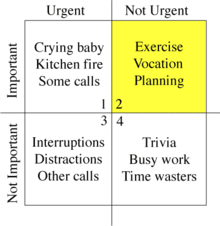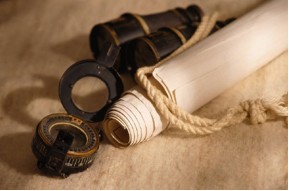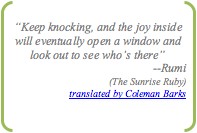Workflow planners have lots of advice on time management but generally assume that you already have firm grip on your basis for setting priorities.
One of my favorite time planning systems, Steven Covey’s “First Things First,†charts tasks according to  quadrants:
quadrants:
- urgent-and-important;
- not-urgent-but-important;
- urgent-but-not-important;
- not-urgent-and-not-important.
Very helpful; but, beyond the crying baby and the kitchen fire, I still need to figure out what is truly important.
There seems to be an assumption that we either already know or can sit down and – using logic – decide what is most important in the plethora of demands and desires that make up our lives.
Right.  Since I don’t just automatically know which tasks ought to go first, I’m supposed to DECIDE? Everything I’m doing is important! I can list lots of reasons each thing is important to me (including the fact that it is important to others that I do what I’ve agreed to do).
So, being a sincere and responsible adult, I sit down to figure out which things get put off decide on priorities.  I begin and here come the lists of pro’s and con’s, the calculator, the calendar, the waffling, the talks with trusted confidants, the worry about making a wrong decision or making someone unhappy with me. And subtly, under it all, a secret struggle is engaged between what I am telling myself should be most important and my underground sense that the SHOULD trail leads away from the FUN.
I begin and here come the lists of pro’s and con’s, the calculator, the calendar, the waffling, the talks with trusted confidants, the worry about making a wrong decision or making someone unhappy with me. And subtly, under it all, a secret struggle is engaged between what I am telling myself should be most important and my underground sense that the SHOULD trail leads away from the FUN.
To top it all off, once an order of importance is decided, my nag goes into full operation, running a critical eye down the list, second-guessing the ramifications and reminding me that things are languishing, deadlines are looming, expectations are teetering on the brink of disappointment . . . blechk!
I need a way to know what is important. I need way to set an order of priorities that my nag will sign-up for and support rather than use as a way to drain all hope of fun from my days.Â
Don’t Decide.  DISCOVER.
When I set out to decide, I doom myself to the lists and the calculators. Â Before IÂ know it I am dictating life choices by shoulds and numbers.
Discovery is not about setting up an equation to calculate relative importance of everything in my life.
 It is about asking questions, testing, experimenting, forming hypotheses, trying out prototypes, planting seeds and seeing which harvest blossoms and which has thorns.  Discovery means tracking the trail of my attention, my curiosity, my willing efforts and uncovering what it is that naturally draws me forward or boosts my energy.
It is about asking questions, testing, experimenting, forming hypotheses, trying out prototypes, planting seeds and seeing which harvest blossoms and which has thorns.  Discovery means tracking the trail of my attention, my curiosity, my willing efforts and uncovering what it is that naturally draws me forward or boosts my energy.
I’m not abandoning logic or clear-eyed analysis; but I am making it a tool rather than a governor. I become an intrepid explorer – seeking the source of a jungle river, climbing peaks, wading through swamps, and glimpsing signs of the origin point for my interest and energies. Consideration of pro’s and con’s is built into exploration and experimentation.  Discovering the source–the origin of that magnetic pull which draws my lively interest–illuminates what is organically important to me and for me. Realizing what is organically important to me then gives me a way to approach the daily shifts in levels of urgency that stubbornly refuse to align with a prescribed ‘order of importance.’
 How to explore? How to discover? Go forward, alert to your willingness, alert to what you are telling yourself when you feel resistance to something. Pay attention to the whole story you are telling yourself (not just the synopsis that is your emotional reaction).**  Notice the quality of energy that you feel as you work through the tasks at hand or as you make a decision.
How to explore? How to discover? Go forward, alert to your willingness, alert to what you are telling yourself when you feel resistance to something. Pay attention to the whole story you are telling yourself (not just the synopsis that is your emotional reaction).**  Notice the quality of energy that you feel as you work through the tasks at hand or as you make a decision.
 Don’t worry about making a mistake – this is all an experiment. Discovery is all about curiosity, about exploring and opening a way that naturally suits your strengths and interests and that also answers your full range of needs (like rent, food, and fun).   Look for what awakens feelings of liveliness.
Don’t worry about making a mistake – this is all an experiment. Discovery is all about curiosity, about exploring and opening a way that naturally suits your strengths and interests and that also answers your full range of needs (like rent, food, and fun).   Look for what awakens feelings of liveliness.
This liveliness is the breath of your spirit released into your everyday life. It leads to your spirited livelihood.
** I sometimes find it helpful to actually write out the thoughts that are running through my head. Often when I do this I find that I can discard a good bit of the story as patently absurd.
